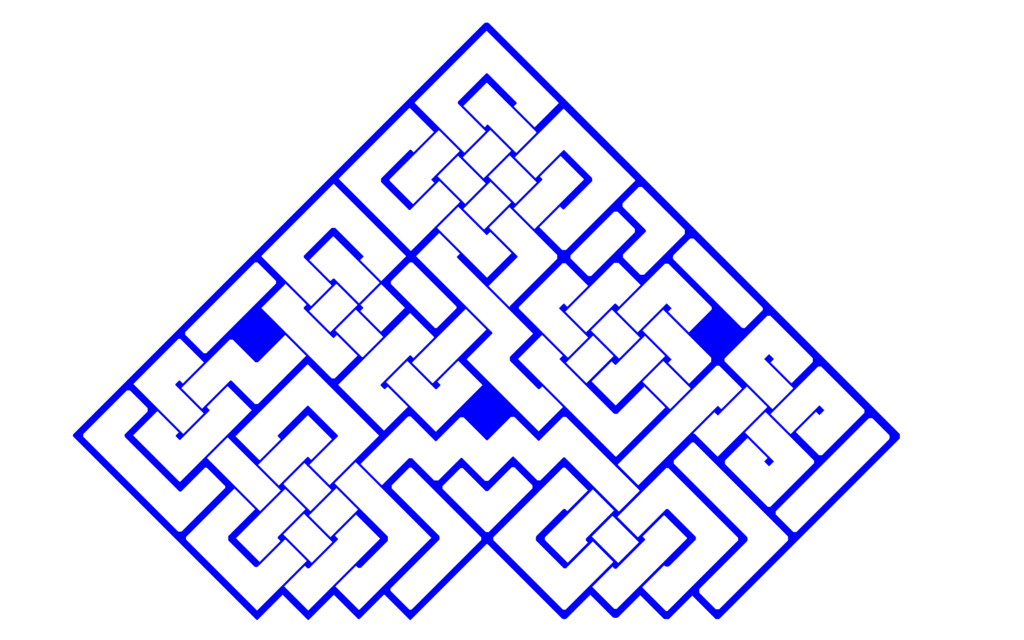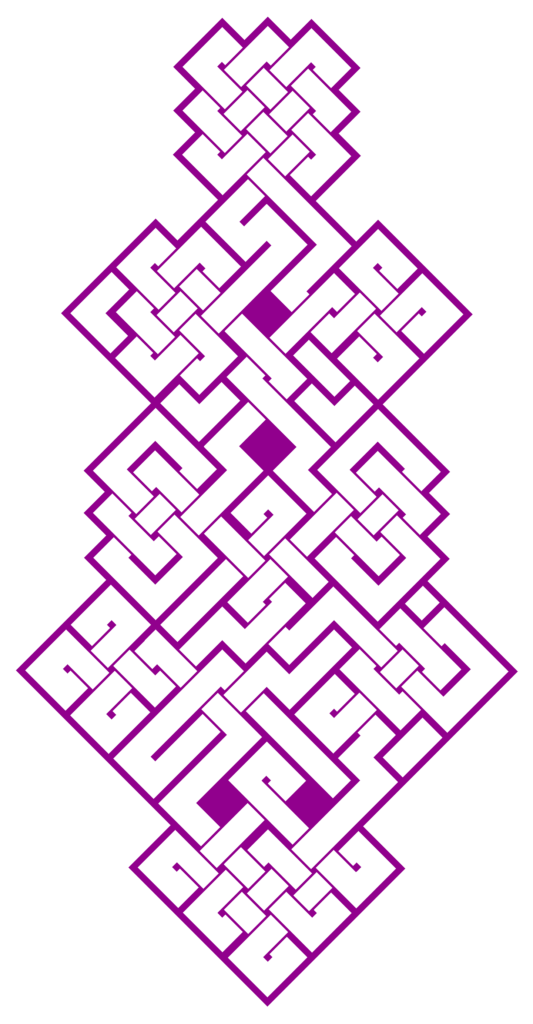Here is more of the funlang. This time I did the Eye Juggler text from Dirk Elzinga.
- Piyayuri
- Piya-yuri
- Piya-spirit
- wununday
- wunu-nday
- see-DISTPAST+IMPERF+REP
Piya was seeing something.
OK, so proper names get classifiers, too
- du
- du
- COMMENT
- yirunday
- yiru-nday
- follow-DISTPAST+IMPERF+REP
This was as follows.
- kibikibinuya
- kibikibi-nuya
- children.in.group-ANIMATE
- Tabunihunday
- Tabuni-hu-nday
- Tabuni-belonging.to-DISTPAST+IMPERF+REP
Children were belonging to Tabuni.
And marking plural on the predicate amuses me, so…
- Ɂa
- Ɂa
- SAME
- gurawunday
- gura-wu-nday
- play-PL.TOPIC-DISTPAST+IMPERF+REP
They were playing.
- du
- du
- COMMENT
- yirunday
- yiru-nday
- follow-DISTPAST+IMPERF+REP
This was as follows.
- nuya
- nuya
- ANIMATE
- Ɂasamuwunday
- Ɂasa-mu-wu-nday
- grasp-out-PL.TOPIC-DISTPAST+IMPERF+REP
They were plucking out something.
And with classifiers that can be used as pronouns, there is no need for separate third person pronouns.
- wuŋiwubiya
- wuŋi-wu-biya
- eye-PL-ROUND
- hutuwunday
- hutu-wu-nday
- in.hand-PL.TOPIC-DISTPAST+IMPERF+REP
Eyes were in hands.
- Ɂa
- Ɂa
- SAME
- tuyawayuwunday
- tuyawa-yu-wu-nday
- throw-up-PL.TOPIC-DISTPAST+IMPERF+REP
And they (the eyes) were thrown upwards.
- Ɂa
- Ɂa
- SAME
- rusutuduwunday
- rusu-tudu-wu-nday
- return-CAUS-PL.TOPIC-DISTPAST+IMPERF+REP
And they were made to return.
- du
- du
- COMMENT
- wuŋikabanuwunday
- wuŋi-kaba-nu-wu-nday
- eye-hole-COME-PL.TOPIC-DISTPAST+IMPERF+REP
This was into eye sockets.
- Piyayuri
- Piya-yuri
- Piya-spirit
- guraɁuŋinday
- gura-Ɂuŋi-nday
- play-MUST-DISTPAST+IMPERF+REP
Piya wanted to play.
- wuŋibiya
- wuŋi-biya
- eye-ROUND
- zuyanday
- zuya-nday
- dark-DISTPAST+IMPERF+REP
(Piya’s) eyes were dark.
- Ɂa
- Ɂa
- SAME
- Ɂaranday
- Ɂara-nday
- reflective-DISTPAST+IMPERF+REP
And they were shiny.
- yuri
- yuri
- spirit
- Ɂasamundat
- Ɂasa-mu-ndat
- grasp-out-DISTPAST+PERF+REP
Piya plucked out something.
- biya
- biya
- round
- hutundat
- hutu-ndat
- in.hand-DISTPAST+PERF+REP
They (the eyes) were in hand.
- Ɂa
- Ɂa
- SAME
- tuyapayundat
- tuyapa-yu-ndat
- be.thrown-PASS-up-DISTPAST+PERF+REP
And they were thrown upwards.
- Ɂa
- Ɂa
- SAME
- turunandat
- turu-na-ndat
- go.down-BEGIN-DISTPAST+PERF+REP
And they begin to come down.
- du
- du
- COMMENT
- pasarandat
- pasara-ndat
- interrupted-DISTPAST+PERF+REP
This was interrupted.
- du
- du
- COMMENT
- suŋudundat
- suŋudu-ndat
- cedar.tree-DISTPAST+PERF+REP
This (interruption) was a cedar tree.
- yuri
- yuri
- spirit
- ranaranatudundat
- ranarana-tudu-ndat
- shake-CAUS-DISTPAST+PERF+REP
Piya made something shake.
- suŋuduɁuda
- suŋudu-Ɂuda
- cedar.tree-TREE
- ranaranandat
- ranarana-ndat
- shake-DISTPAST+PERF+REP
The cedar tree shook.
- biya
- biya
- round
- turutupandat
- turu-tupa-ndat
- go.down-FAIL-DISTPAST+PERF+REP
The eyes did not come down.
- kibikibinuya
- kibikibi-nuya
- children.in.group-ANIMATE
- riniriniwundat
- rinirini-wu-ndat
- laugh-PL.TOPIC-DISTPAST+PERF+REP
The children laughed.
- nuya
- nuya
- ANIMATE
- pusupusuwundat
- pusupusu-wu-ndat
- mockery-PL.TOPIC-DISTPAST+PERF+REP
They mocked someone.
- Piyayuri
- Piya-yuri
- Piya-spirit
- pusupusupandat
- pusupusu-pa-ndat
- mockery-PASS-DISTPAST+PERF+REP
Piya was mocked.
- du
- du
- COMMENT
- nurutudundat
- nuru-tudu-ndat
- anger-CAUS-DISTPAST+PERF+REP
This caused anger.
- du
- du
- COMMENT
- Piyasundat
- Piya-su-ndat
- Piya-LOC-DISTPAST+PERF+REP
This was in Piya.
- Ɂa
- Ɂa
- SAME
- zunandat
- zuna-ndat
- reason-DISTPAST+PERF+REP
And this was the reason.
- du
- du
- COMMENT
- yirunday
- yiru-nday
- follow-DISTPAST+IMPERF+REP
This was as follows.
- yuri
- yuri
- spirit
- yiriyiruganundat
- yiriyiru-ganu-ndat
- run-BEHIND-DISTPAST+PERF+REP
Piya chased after something.
- nuya
- nuya
- ANIMATE
- yiriyiruganupawundat
- yiriyiru-ganu-pa-wu-ndat
- run-BEHIND-PASS-DISTPAST+PERF+REP
They (the children) were chased.
- Ɂa
- Ɂa
- SAME
- hutudutupawundat
- hutu-(tu)du-tupa-wu-ndat
- in.hand-CAUS=FAIL-PL.TOPIC-DISTPAST+PERF+REP
And they were not caught.
So this is one way to make things less agglutinative – drop a syllable that is identical to the previous syllable. I suppose I should make sure I didn’t forget to do this elsewhere.
- yuri
- yuri
- spirit
- yiriyiruturandat
- yiriyiru-tura-ndat
- run-STOP-DISTPAST+PERF+REP
Piya stopped chasing.
- Ɂa
- Ɂa
- SAME
- puzarandat
- puza-ra-ndat
- away-GO-DISTPAST+PERF+REP
Piya left.
- Ɂa
- Ɂa
- SAME
- tayituduɁuŋinday
- tayi-tudu-Ɂuŋi-nday
- new-CAUS-MUST-DISTPAST+IMPERF+REP
Piya must make something new.
- du
- du
- COMMENT
- wuŋinday
- wuŋi-nday
- eye-DISTPAST+IMPERF+REP
These were eyes.
- Ɂa
- Ɂa
- SAME
- ŋuyarunday
- ŋuya-ru-nday
- pine.sap-FROM-DISTPAST+IMPERF+REP
And they were from pine sap.
- wuŋibiya
- wuŋi-biya
- eye-round
- ŋuyaŋu
- ŋuya-ŋu
- pine.sap-LIKE
Piya’s eyes are like pine sap.
- Ɂa
- Ɂa
- SAME
- Ɂarawapawapa
- Ɂara-wapawapa
- reflective-NO.LONGER
And they are no longer shiny.
- Ɂa
- Ɂa
- SAME
- nuya
- nuya
- yellow
And they are yellow.














